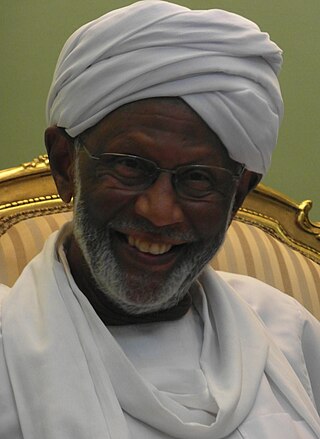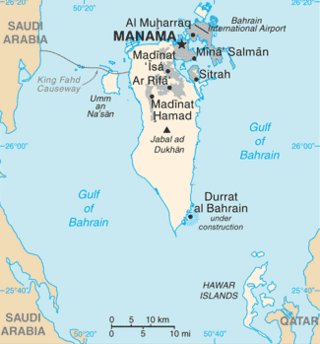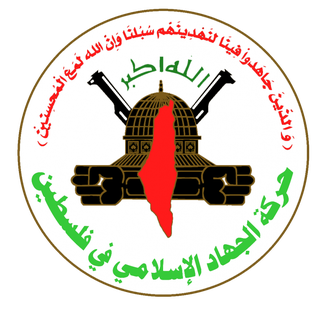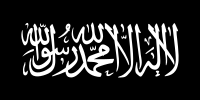
The politics of Eritrea and the government of Eritrea take place in the framework of a single-party presidential republic. The President officially serves as both head of state and head of government. The People's Front for Democracy and Justice is the only political party legally permitted to exist in Eritrea. The popularly elected National Assembly of 150 seats, formed in 1993 shortly after independence from Ethiopia, elected the current president, Isaias Afwerki. There have been no general elections since its official independence in 1993 due to state of war with neighboring Ethiopia. A new constitution was drafted in 1993 and ratified in 1997. It has been implemented except the presidential election. Since the National Assembly last met in January 2002, president Isaias has exercised the powers of both the executive and legislative branches of government.

Jamaat-e-Islami Pakistan (JIP), is a Pakistani Islamist political party. It is the Pakistani successor to Jamaat-e-Islami, which was founded in colonial India in 1941. JIP is a "vanguard party", whose members are intended to be leaders spreading party beliefs and influence. Supporters not thought qualified to be members may become "affiliates", and beneath them are "sympathizers". The party leader is called an "ameer". Although, it does not have a large popular following, the party is quite influential and considered one of the major Islamic movements in Pakistan, along with Deobandi and Barelvi.

Hassan al-Turabi was a Sudanese politician and scholar. He was the alleged architect of the 1989 Sudanese military coup that overthrew Sadiq al-Mahdi and installed Omar al-Bashir as president. He has been called "one of the most influential figures in modern Sudanese politics" and a "longtime hard-line ideological leader". He was instrumental in institutionalizing Sharia in the northern part of the country and was frequently imprisoned in Sudan, but these "periods of detention" were "interspersed with periods of high political office".

Harkat-ul-Mujahideen is a Pakistan-based Islamist jihadist group operating primarily in Kashmir. The group had links to Osama bin Laden and Mullah Omar.
The National Islamic Front was an Islamist political organization founded in 1976 and led by Dr. Hassan al-Turabi that influenced the Sudanese government starting in 1979, and dominated it from 1989 to the late 1990s. It was one of only two Islamic revival movements to secure political power in the 20th century.

Mohammad Nabi Mohammadi was an Afghan politician and mujahideen leader who was the founder and leader of the Harakat-i-Inqilab-i-Islami political party and paramilitary group. He served as President of Afghanistan under the mujahideen from January 1993 to 1996.
Osama bin Laden authored two fatāwā in the late 1990s. The first was published in August 1996 and the second in February 1998. At the time, bin Laden was not a wanted man in any country except his native Saudi Arabia, and was not yet known as the leader of the international jihadist organization al-Qaeda. These fatāwā received relatively little attention until after the August 1998 United States embassy bombings, for which bin Laden was indicted. The indictment mentions the first fatwā, and claims that Khalid al-Fawwaz, of bin Laden's Advice and Reformation Committee in London, participated in its communication to the press.

The 1920 Revolution Brigades was a Sunni militant and insurgent group in Iraq, formed by former members of the disbanded Saddam-era Iraqi military, following the 2003 American invasion of Iraq. The group had used improvised explosive devices, and armed attacks against U.S.-led Coalition forces and comprises the military wing of the Islamic Resistance Movement. The group was named in reference to the Iraqi revolt of 1920.
The Islamic Foundation is Jamaat-e-Islami's research and publishing house in the United Kingdom. It was established in 1973 by two high-ranking Pakistani activists of Jamaat-e-Islami, Khurshid Ahmad and Khurram Murad. Its objectives are to research into the implementation of Islam in the modern world, to project the image of Islam in Britain and Europe, and to meet the educational needs of Muslims.

The 1990s uprising in Bahrain also known as the uprising of dignity was an uprising in Bahrain between 1994 and 1999 in which leftists, liberals and Islamists joined forces to demand democratic reforms. The uprising caused approximately forty deaths and ended after Hamad bin Isa Al Khalifa became the Emir of Bahrain in 1999 and a referendum on 14–15 February 2001 massively supported the National Action Charter. The uprising resulted in the deaths of around 40 civilians and at least one Bahraini soldier.

Harkat-ul-Jihad-al-Islami is a Pakistani Islamist extremist, fundamentalist and terrorist organization affiliated with Al-Qaeda and the Taliban.

Abul A'la al-Maududi was an Islamic scholar, Islamist ideologue, Muslim philosopher, jurist, historian, journalist, activist, and scholar active in British India and later, following the partition, in Pakistan. Described by Wilfred Cantwell Smith as "the most systematic thinker of modern Islam", his numerous works, which "covered a range of disciplines such as Qur'anic exegesis, hadith, law, philosophy, and history", were written in Urdu, but then translated into English, Arabic, Hindi, Bengali, Telugu, Tamil, Kannada, Burmese, Malayalam and many other languages. He sought to revive Islam, and to propagate what he understood to be "true Islam". He believed that Islam was essential for politics and that it was necessary to institute sharia and preserve Islamic culture similarly as to that during the reign of the Rashidun Caliphs and abandon immorality, from what he viewed as the evils of secularism, nationalism and socialism, which he understood to be the influence of Western imperialism.

The Islamic Jihad Movement in Palestine, commonly known simply as Palestinian Islamic Jihad (PIJ), is a Palestinian Islamist paramilitary organization formed in 1981.

Salafi jihadism, also known as Salafi-jihadism, jihadist Salafism and revolutionary Salafism, is a religiopolitical Sunni Islamist ideology that seeks to establish a global caliphate. In a narrower sense, jihadism refers to the belief that armed confrontation with political rivals is an efficient and theologically legitimate method of socio-political change. The Salafist interpretation of sacred Islamic texts is "in their most literal, traditional sense", which adherents claim will bring about the return to "true Islam".
Jamaat-e-Islami is an Islamist fundamentalist movement founded in 1941 in British India by the Islamist author, theorist, and socio-political philosopher, Syed Abul Ala Maududi, who was inspired by the Muslim Brotherhood. It is considered one of the most influential Islamist organisations, and was the first to develop an ideology based on the modern revolutionary conception of Islam. Its founding branch in Pakistan is the nation's largest fundamentalist party.
Called together in the Sudan by Hassan al-Turabi, the 1991 Popular Arab and Islamic Congress Conference sought to unify Mujahideen and other Islamic elements in the wake of the Soviet withdrawal from Afghanistan and the Iraqi defeat in the Gulf War. It sought to provide an alternative to the Saudi-dominated Organization of the Islamic Conference, although it did not have its financial means.

Ramadan Abdullah Mohammed Shalah was a Palestinian military officer and the leader of Palestinian Islamic Jihad (PIJ), a militant anti-Zionist group, between 27 October 1995 and 2018.

Azizul Haque, also known as by his epithet Shaykh al-Hadith was a Bangladeshi Islamic scholar, politician, writer, and translator. He is the founder of Bangladesh Khelafat Majlis and first Bangali translator of Sahih al-Bukhari. He was vice chancellor of Jamia Rahmania Arabia Dhaka.
Fazal ur Rehman Khalil is a founder of Harkat-ul-Mujahideen and current leader of Ansar-ul-Umma, which is accused of being a front organization of the banned HuM. He also runs the Jamia Khalid Bin Walid, a madrasa or Islamic seminary located in the Shams Colony of Islamabad’s Golra town which has been accused of supporting the Tehrik-i-Taliban Pakistan. He is considered to be close to the Talibans and former Pakistan Prime Minister Imran Khan.

Starting in the mid-1970s and 1980s, Salafism and Wahhabism — along with other Sunni interpretations of Islam favored by the Kingdom of Saudi Arabia and other Gulf monarchies — achieved a "preeminent position of strength in the global expression of Islam."














